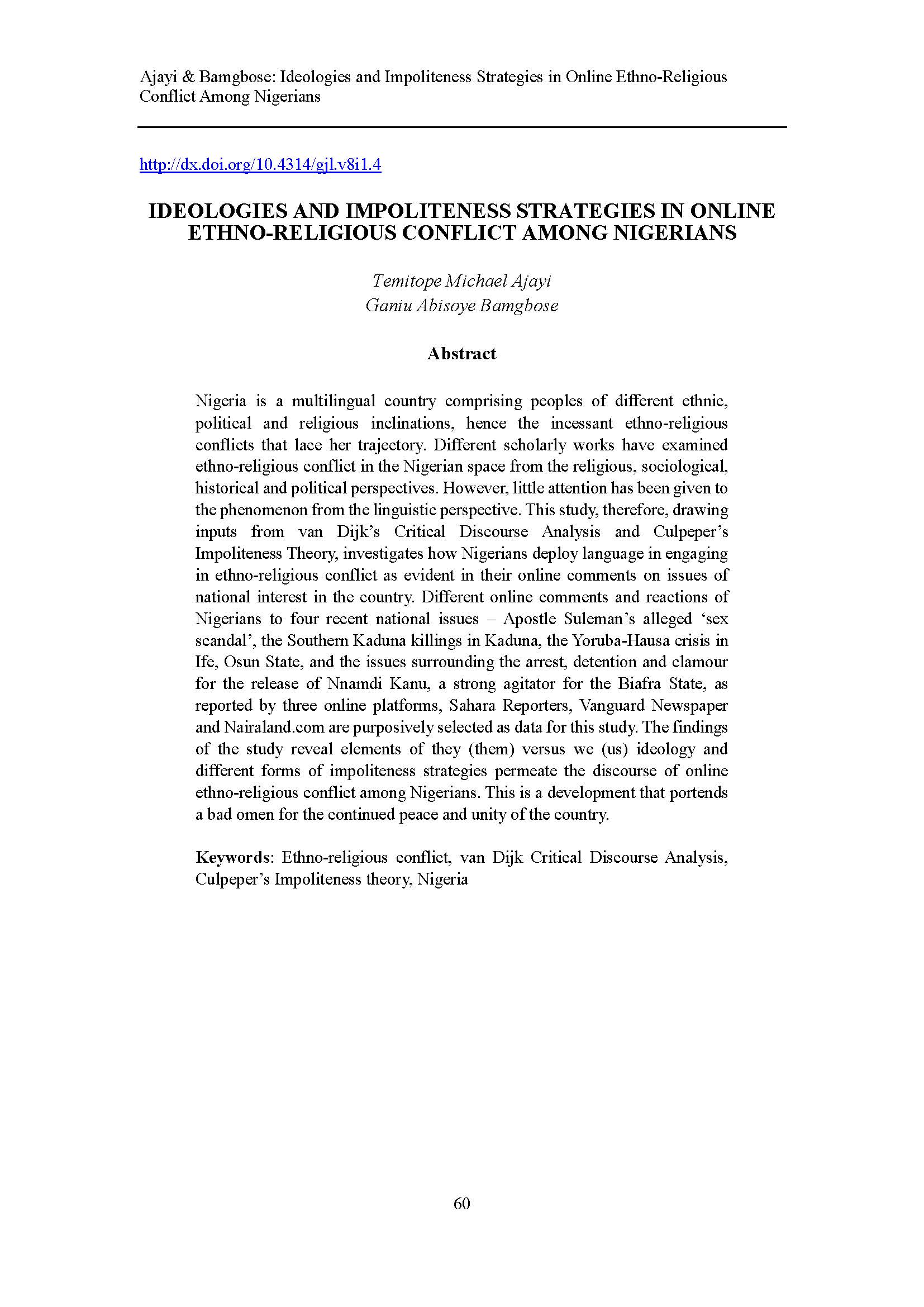Ideologies and Impoliteness Strategies in Online Ethno-religious Conflicts among Nigerians
DOI:
https://doi.org/10.4314/gjl.v8i1.89Keywords:
Ethno-religious conflict, van Dijk Critical Discourse Analysis, Culpeper’s Impoliteness theory, NigeriaAbstract
Nigeria is a multilingual country comprising peoples of different ethnic, political and religious inclinations, hence the incessant ethno-religious conflicts that lace the trajectory of the country. Different scholarly works have examined ethno-religious conflict in the Nigerian space from the religious, sociological, historical and political perspectives. However, little attention has been given to the phenomenon in the country from the linguistic perspective. This study, therefore, drawing inputs from van Dijk’s Critical Discourse Analysis and Culpeper’s Impoliteness Theory, investigates how Nigerians deploy language in engaging in ethno-religious conflicts as evident in their online comments on issues of national interest in the country. Online comments and reactions of Nigerians to four current national issues – Apostle Suleman’s alleged ‘sex scandal’, the Southern Kaduna killings in Kaduna, the Yoruba-Hausa crisis in Ife, Osun State, and the issues surrounding the arrest, detention and clamour for the release of Nnamdi Kanu, a strong agitator for the Biafra State, as reported by three online platforms, Sahara Reporters, Vanguard Newspaper and Nairaland.com are purposively selected as data for this study. The findings of the study reveal elements of they(them) versus we(us) ideology, and different forms of impoliteness strategies permeate the discourse of online ethno-religious conflict among Nigerians. This is a development that portends a bad omen for the continued peace and unity of the country.
References
Nigeria. Global Journal of Arts Humanities and Social Sciences Vol.3, No.1 ,pp. 51-58.
Ajayi, Adeyinka T. & Buhari, Lateef O. 2014 Methods of Conflict Resolution in African
Traditional Society, African Research Review, An International Multidisciplinary Journal, Ethiopia Vol. 8 (2), Serial No. 33, April, 2014:138-157
Ayantayo, J. Kehinde. 2005. “Sociological Examination of Inter-Religious Conflict in
Africa” in Albert I. Olawale (Ed) Perspectives on Peace and Conflict in Africa,
Ibadan, John Archers Publishers
Bamgbose, Ayo. 2000. Language and Exclusion: The Consequences of Language Policies in Africa. Hamburg-London, Litvraig.
Coser, Lewis A. 1956. The functions of social conflict: New York: Free Press
Crozier, David. and Blench, Roger (1992). An Index of Nigerian Languages. Texas and Abuja: SIL and the NERDC.
Culpeper, Jonathan. 2011. Impoliteness – Using Language to Cause Offence. Cambridge:
University Press.
Culpeper, Jonathan. 2008. Reflections on impoliteness, relational work and power in
Bousfield, Derek & Locher, Miriam (eds.), Impoliteness in Language – Studies on its Interplay with Power and Practice. Berlin: Mouton de Gruyter.
Culpeper, Jonathan. 1996. Towards an anatomy of impoliteness, Journal of Pragmatics 25,
349- 367
Egbokhare, Francis. 2004. ‘Language and Politics in Nigeria’ pp. 507-522, in eds. Owolabi, Kola and Ademola Dasylva. Forms and Functions of English and Indigenous Languages in Nigeria. A Festschrift in Honour of Ayo Banjo. Ibadan: Group Publishers.
Ethnologue Language of the World. 2017. https://www.ethnologue.com/country/NG,
accessed 28/3/2017
Fawole, Oluwafemi A. and Bello, M. L. 2011. The impact of ethno-religious conflict on
Nigerian Federalism. International NGO Journal Vol. 6(10), pp. 211-218,
Idahosa, Osaretin .2013. Ethno-Religious Conflict and Peace Building in Nigeria: The Case
of Jos, Plateau State. Academic Journal of Interdisciplinary Studies, Vol 2 No 1 pp 349-360
Jega, Attahiru. 2002. Tackling Ethno-Religious Conflict in Nigeria. The Nigerian Social
Scientist, Vol.5, No.2 (September) pp 35-39.
Kuntsi, Piia. 2012. Politeness and impoliteness strategies used by lawyers in the ‘Dover
Trial’ –A Case Study. Thesis, English Department, University of Eastern Finland,
Finland.
Mills, Sara. (2003) Gender and politeness. Cambridge: Cambridge University Press.
Osaghae, Eghosa . E. 2011. The Crippled Giant: Nigeria Since Independence. Ibadan: John
Archers Publishers
Rashidi, Nasser and Souzandehfar, Marzieh. 2010 A critical discourse analysis of the
debates between Republicans and Democrats over the continuation of war in Iraq. The Journal of Linguistic and Intercultural Education (JoLIE) 3/2010, 55-82
Sule, Noah. R. 2012. Ethno-Religious Conflicts, Mass Media and National Development:
The Northern Nigeria Experience. A PhD thesis in the Department of Religion and Philosophy, Faculty of Arts, University of Jos.
Weber, Max. 1971. Max Weber on race and society (Trans.). Social Research, 38, 30-41.
(Original work published 1910)
van Dijk T. A.2004a. Politics Ideology and Discourse. Retrieved fromhttp://www.discourse-in-
society.org/teun.html
Wodak, R. 2001. The discourse-historical approach. In R. Wodak, & M. Meyer Eds. Methods of
Critical Discourse Analysis. London: Sage.Wodak, R., de Cillia, R., Reisigl, M. &
Liebhart, K. 1999. The discursive construction of national identity. Edinburgh: Universit
van Dijk T. A.2004a. Politics Ideology and Discourse. Retrieved fromhttp://www.discourse-in-
society.org/teun.html
Wodak, R. 2001. The discourse-historical approach. In R. Wodak, & M. Meyer Eds. Methods of
Critical Discourse Analysis. London: Sage.Wodak, R., de Cillia, R., Reisigl, M. &
Liebhart, K. 1999. The discursive construction of national identity. Edinburgh: Universit
van Dijk T. A.2004a. Politics Ideology and Discourse. Retrieved fromhttp://www.discourse-in-
society.org/teun.html
Wodak, R. 2001. The discourse-historical approach. In R. Wodak, & M. Meyer Eds. Methods of
Critical Discourse Analysis. London: Sage.Wodak, R., de Cillia, R., Reisigl, M. &
Liebhart, K. 1999. The discursive construction of national identity. Edinburgh: Universitvan Dijk Teun A. 2004. Politics Ideology and Discourse. Retrieved fromhttp://www.discourse-in-society.org/teun.html
Van Dijk T. A.2004. Politics Ideology and Discourse. Retrieved fromhttp://www.discourse- in-society.org/teun.html
Wodak, Ruth . 2001. The discourse-historical approach. In Ruth Wodak, & Michael Meyer
(Eds.) Methods of Critical Discourse Analysis. London: Sage.
Sources of Data
http://saharareporters.com/2017/03/15/i-stand-apostle-suleman-fayose-says. Accessed
20/3/2017
http://www.vanguardngr.com/2017/01/un-wades-s-kaduna-killings-can-replies-council-
imams-youre-hypocrites/ Accessed 20/3/2017
http://www.nairaland.com/3670783/yoruba-hausa-clash-ile-ife-5. Accessed 20/3/2017
http://www.vanguardngr.com/2017/02/ipob-warns-continued-detention-nnamdi-kanu/. Accessed 20/3/2017

Downloads
Published
How to Cite
Issue
Section
License
The Ghana Journal of Linguistics is published by the Linguistics Association of Ghana, P. O. Box LG 61, Legon, Accra, Ghana.
LAG Email: linguisticsgh@gmail.com. Website: http://www.laghana.org
GJL Email: gjl@laghana.org Website: http://www.laghana.org/gjl
© Linguistics Association of Ghana and individual authors, 2023.
